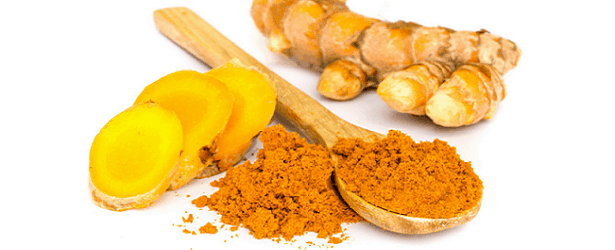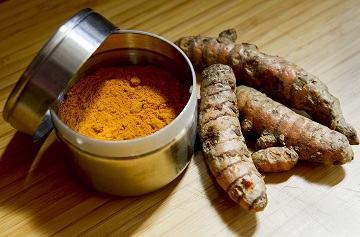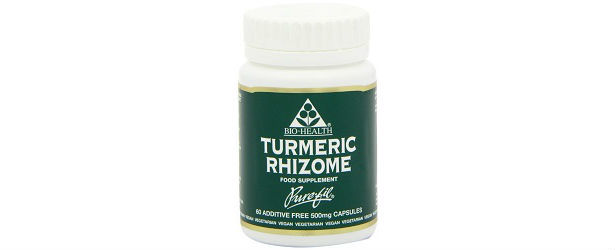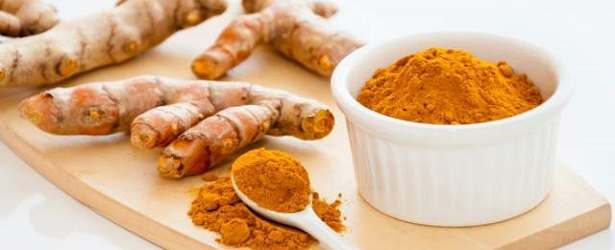
Turmeric and Your Health
Do you want to reduce inflammation and up your antioxidant intake, maybe get relief from arthritis or help yourself think better, even defend against Alzheimer’s and other cognitive difficulties associated with aging? Experts say you can with a daily dose of turmeric.
Turmeric? Yes, it’s an herb well-worth using. A plant from the ginger family, its underground stems are boiled and ground, and the resulting powder used as a spice or for supplements. It’s the stuff that makes curry yellow, sometimes called Indian saffron, and is used in many Asian and African cuisines.
 Turmeric has a track record that goes back more than 4000 years in Ayurvedic medicine. It provides any number of health benefits and is considered to be a cleanser in the body. It has a proven antibacterial quality and is used to treat wounds, and it can help alleviate circulatory, menstrual, and digestive troubles. For example, added to dishes with beans, turmeric helps with bloating and gas. It’s also used to treat swelling, asthma, and allergies, and recently it has been shown to be effective in healing peptic ulcers. In India turmeric is eaten daily by most of the population, and the risk for Alzheimer’s is 25 percent lower than in the United States. Cell death and inflammation are thought to be involved in Alzheimer’s and studies indicate that turmeric is beneficial in stopping both of these.
Turmeric has a track record that goes back more than 4000 years in Ayurvedic medicine. It provides any number of health benefits and is considered to be a cleanser in the body. It has a proven antibacterial quality and is used to treat wounds, and it can help alleviate circulatory, menstrual, and digestive troubles. For example, added to dishes with beans, turmeric helps with bloating and gas. It’s also used to treat swelling, asthma, and allergies, and recently it has been shown to be effective in healing peptic ulcers. In India turmeric is eaten daily by most of the population, and the risk for Alzheimer’s is 25 percent lower than in the United States. Cell death and inflammation are thought to be involved in Alzheimer’s and studies indicate that turmeric is beneficial in stopping both of these.
A recent study found that one dose of turmeric helped elderly people improve attention and memory, and taken over a few weeks it helped improve mood by reducing stress. Study participants reported feeling more contented. Turmeric is thought to strengthen the transmission of electrical signals in the brain.
Turmeric’s antioxidant properties may also be of benefit in fighting cancer. Our cells are constantly assaulted by free radicals, and as we age cell damage can cause DNA to split imperfectly, which can lead to a variety of health concerns, even cancer. Curcumin, the active ingredient in turmeric, works like other antioxidants in that it is thought to fight free radicals. Curcumin has also been shown to destroy cancer cells.
Turmeric is generally considered safe when it’s used as a spice and in home remedies, and it has no known drug interactions. Although be aware that problems can occur if people ingest large quantities of the herb.
 Turmeric does help with a large number of conditions, but it’s not indicated for people who already suffer from certain health concerns. As an example, turmeric is a blood thinner, so while it helps prevent against strokes and heart attacks, it’s not recommended for people with blood clotting problems or with low blood pressure. You need to work with your doctor to manage these conditions.
Turmeric does help with a large number of conditions, but it’s not indicated for people who already suffer from certain health concerns. As an example, turmeric is a blood thinner, so while it helps prevent against strokes and heart attacks, it’s not recommended for people with blood clotting problems or with low blood pressure. You need to work with your doctor to manage these conditions.
Turmeric is also not recommended for people with heart disease, jaundice, or certain gallstone problems. So anyone with these or related conditions is advised to talk to their doctor before considering supplementation.
As with all herbal remedies, pregnant women should not use turmeric supplements without discussing it with their doctor first.
TOP 5
TURMERICSupplements |
|||||
| Turmeric Curcumin Premium | NutriDosha | Source Naturals Turmeric | Sandhu's Curcumin C3 Complex | EverPure Turmeric Curcumin | |
|---|---|---|---|---|---|
| 1 | 2 | 3 | 4 | 5 | |
| Price (1 bottle) Price (6 bottles) Best Value |
$48.00 $138.00 |
$37.50 $225.00 |
$34.50 $207.00 |
$29.95 $179.70 |
$24.47 $146.82 |
| Overall Rating | 99.50% | 84.30% | 81.00% | 73.50% | 69.50% |
| Effectiveness |





|





|





|





|





|
| Speed of Results | Extremely Fast | Good | Good | Average | Average |
| Quality of Ingredients | Premium | Good | Average | Average | Average |
| Customer Satisfaction Evaluation | 99.20% | 86.30% | 81% | 73% | 70.30% |
| Safety Evaluation | Safe for Use | Safe for Use | Safe for Use | Safe for Use | Safe for Use |
| Customer Service Rating |





|





|





|





|





|
| Reorder Rate | Highest | Good | Good | Average | Average |
| Return Policy | Risk Free | No | Unclear | No | Unclear |
| Success Rate | 99.40% | 86.20% | 81% | 74.50% | 69% |

 Subscribe Now
Subscribe Now











